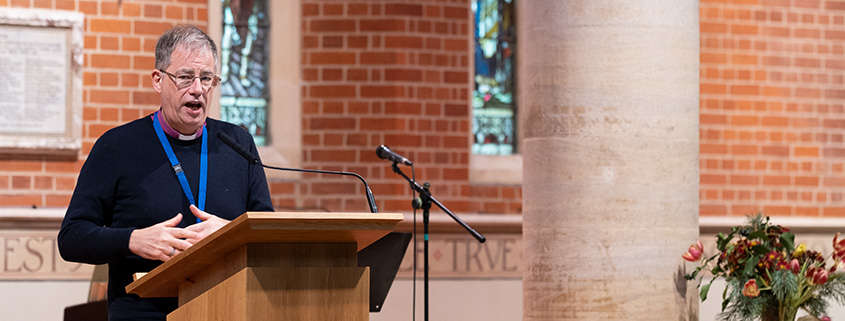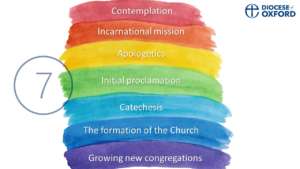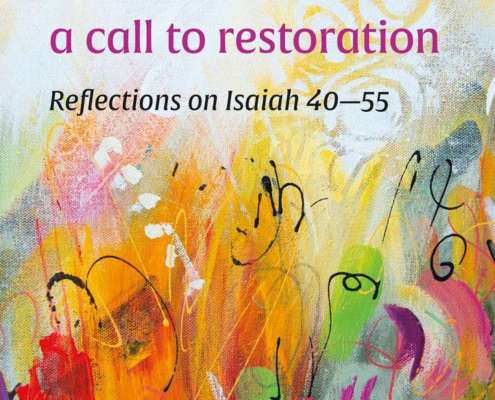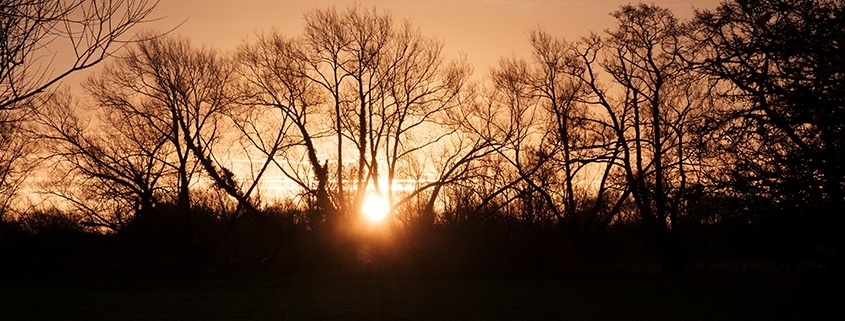This article offers some biblical and theological reflection on where we are and where we are going, based around the Beatitudes. But my way into that reflection are two sets of statistics.
The first are the Census results published 30 November. The banner headline in the i newspaper: ‘UK Christians in minority for first time since the Dark Ages’. According to the Census, less that half the UK population identify as Christian for the first time in 1,500 years. The Express led with the same story: less than half of population is Christian. We were expecting the outcome of the Census. We know that we are becoming more diverse as a society. We know that those of no religion are the fastest growing group. But the figure is significant, a timely reminder of the challenges we face and something of a call to action.
The second statistics are the first analysis of church attendance across the diocese from October 2022. These are not yet complete. The full report will be published in the next few weeks and the full statistics for mission later in the year. But thanks to Dr Bev Botting’s analysis we have a first take on what is happening as a whole across the diocese in terms of church attendance at this point in the journey through and beyond COVID.
The statistics confirm what you will know from your own deanery. Thanks to the prayers and love and sheer hard work of clergy and lay ministers and volunteers we are 80% there in terms of this long regathering. That’s an amazing achievement after the disruption of COVID and all of the ongoing demands.
We know the overall picture is still quite fragile. Recovery is taking longer than anticipated. I was in Slough in mid-December listening to the clergy chapter. Once again I found their commitment and dedication hugely impressive. They were experiencing increased pastoral demands higher needs and lower resources. Energy is slow to return to the body of Christ. But there were also here, as elsewhere, many signs of life and hope.
The trend is still upward in terms of attendance: if we take October 19 as our baseline then we were back to 73% of attendance in October 21; a dip again to 67% at Easter 22 (during another COVID wave); and then up to 81% by October.
Those figures increase where churches are still streaming to more than 100% of the October 2019 figure. Fewer churches were streaming in October than at Easter for understandable reasons, but streaming is still worthwhile for those who cannot come to church.
The biggest learning from the October count seems to be that many individual congregations generally are back to their pre-COVID size, but benefices for various reasons have reduced the number of services in the week either on Sundays or midweek – often for understandable reasons of low resources and low energy. Where this happens, by and large, people have not transferred to other worship services.
As God’s life flows back into the vine from this long winter, we need to be putting creativity and resources into re-opening when we can those midweek and Sunday services and beginning new congregations – especially those focussed on children, young people and families. Where that happens – and we see it happening – there are signs of hope and life.
The two sets of statistics give us an indication of what is happening in our wider society and also what is happening in the life of the Church in this season. Both of these snapshots lead us back to our central calling to witness to the love of God in word and in action: to be a more Christ-like Church for the sake of God’s world.
They lead us, I hope into a deeper encounter with God in Christ and they encourage us to place a greater emphasis on sharing our faith in different ways in the coming years with love and with confidence. All too often in my experience, a focus on statistics tips the Church into endless conversations about scarcity and spirals of decline instead of leading to a focus on Christ and on the good news.
Seven disciplines of evangelism
In every generation the Church has developed ways of communicating the gospel. [Papers shared with my senior staff, area deans and lay chairs] unfold what I’ve called the seven disciplines of evangelism: seven colours of a rainbow which make up our common witness.
Our understanding of evangelism will embrace forming disciples who are mature in faith and learning to grow and regrow the Church in the image of Christ. Our evangelism will include forming and growing new congregations to meet the needs of those outside the churches.
New resources to support lay formation and discipleship
We will be launching later this year a whole suite of resources to support lay formation and discipleship in every day faith – including these disciplines. These will include a new one year foundation course for lay ministry to begin in September as a way of exploring and discovering vocation. It will be delivered partly online and partly in person. I hope to be teaching the first term’s programme each year on these seven disciplines of evangelism, so that all of our ministers are equipped and formed in these habits and disciplines.
But as we know, techniques and methods and training courses are not the whole answer. We need as a Church deep spiritual and theological renewal: to come deeper into Christ. We need a fresh outpouring of the Holy Spirit on our work. We need continually a fresh vision of what it means to be human and in Christ.
As we look back in Church history we see clearly that the Church has emphasised different facets of the jewel of the gospel in different times and seasons. In one period of the Church there has been an emphasis on freedom in Christ; in another on assurance of salvation; in another on the experience of God’s Spirit. Each period, each season will take us back to Scripture and the tradition to draw out good news for our own generation. What is that message for this moment, for now, for those who are longing for new life in our own communities?
My own reflection is that this generation, this moment, now, is that this generation is hungry and thirst for significance: to know that they matter and that individual lives matter. That each is deeply precious and loved. I find myself preaching more and more at confirmation services on the words prior to the laying on of hands: Steven, God has called you by name and made you his own. We need to know that we are significant.
Why is this important?
Why is this important now? In part because of what science tells us about the size of the universe. We see more and more clearly if we dare to think about it how vast and ancient the universe is, how marginal the earth is, how tiny and insignificant we are in the physical world. In part because of what technology has done to bring the world together. The global population reached 8 billion on 15th November. Technology connects us together. We are aware of one another. We feel compassion for floods in Pakistan; drone attacks in Kiev and wildfires in California 24 hours a day. Yet many people testify to never feeling more alone. We have knowledge at our fingertips but have never been more in need of wisdom: the ability to live well. That living well begins with a sense of significance: of being someone in the vastness of creation.
This generation in particular lives with a vast and existential fear of the danger to the planet from environmental disaster and climate change which will shape our lives and the lives of our children and grandchildren. In order to combat this disaster we need confidence in our own significance: to know that we can make a difference.
That longing for significance underlies much of what is happening in Church and society. For example, we are working hard on racial justice. The movement which began after the death of George Floyd was called Black Lives Matter. We see this theme of significance in many of the current debates within the Church – including around human sexuality and gender.
We need to know that we are loved, that we matter. The primary place that sense of significance can come from is our maker. The second place that significance comes from is our closest relationships. The way we know that we are loved is to listen to Jesus, to place our trust in Jesus and in the great and transformative truths of the incarnation, the cross and the resurrection.
The Sermon on the Mount is the place that Jesus addresses the question of human significance. Consider the birds of the air, the lilies of the field. Are you not worth more than these? You are so significant that the very words that come from your mouth will be accounted for. Your Father in heaven knows you and loves you. Your Father in heaven sees even and especially what you do in secret, behind closed doors. Your Father in heaven knows and understands even your secret jealousies and hatreds and desires.
Every human life is significant but the Church, the people of God, even more significant. You are the salt of the earth. You are the light of the world. There is a responsibility placed on you because of the grace you have received. In this generation above all we are bearers of meaning for the world.
Eight qualities: the Beatitudes
And this significance is not measured as the world measures it – and here we come at last to the Beatitudes which begin the Sermon on the Mount. In the upside down kingdom of God, this significance and meaning does not belong to the wealthy or powerful, the proud or the educated, the technocrats or the pleasure seekers.
Jesus says blessed – significant – are the poor in spirit – those who know their need of God. Theirs is the kingdom of heaven. The significant ones are those who mourn in compassion for the needs of the world and share its griefs. They shall be comforted.
Blessed are the meek – the really significant ones are the ones who are overlooked. They will inherit the earth. Blessed are those who long to change the world. They will be satisfied.
The ones to notice are the merciful, the gentle, the kind. They will receive mercy. Integrity is significant and, as we know, the rarest of qualities in public life.
Blessed are the pure in heart. Significant are the peacemakers. In fact they are so significant for they will be called children of God. Take notice of those who are persecuted for righteousness sake for theirs is the kingdom of heaven.
Our calling is to be more and more the Church of the Beatitudes: our significance does not rest in the number of people in our congregations or the cleverness of our ministers or the size of our PCC reserves or the beauty of our buildings. Our significance will rest in the way we reflect the character of Christ and witness to God’s love in all we seek to do.
As energy returns to our churches and as the process of spiritual renewal continues, it is vital that we rebalance our common life towards these seven disciplines of evangelism. We have a responsibility to our society and culture to pass on this good news.
But it is even more vital that we remain centred ourselves on these eight beautiful qualities, the best description there has ever been of what it means to be human and the most profound portrait of our Lord and Saviour Jesus Christ. Come and see.
The above text is an edited version of Bishop Steven’s address to the Area Deans and Lay Chairs of the diocese, given at St Paul’s, Slough, on Saturday 28 January 2023
Come and See takes place each Lent in the Diocese of Oxford. It’s our big, warm open invitation to everyone, for everyone for an adventure in faith and trust. It’s something for the local church and the whole community… including children and young people, families and schools. It’s completely free and all are welcome. Find out more at oxford.anglican.org/come-and-see













